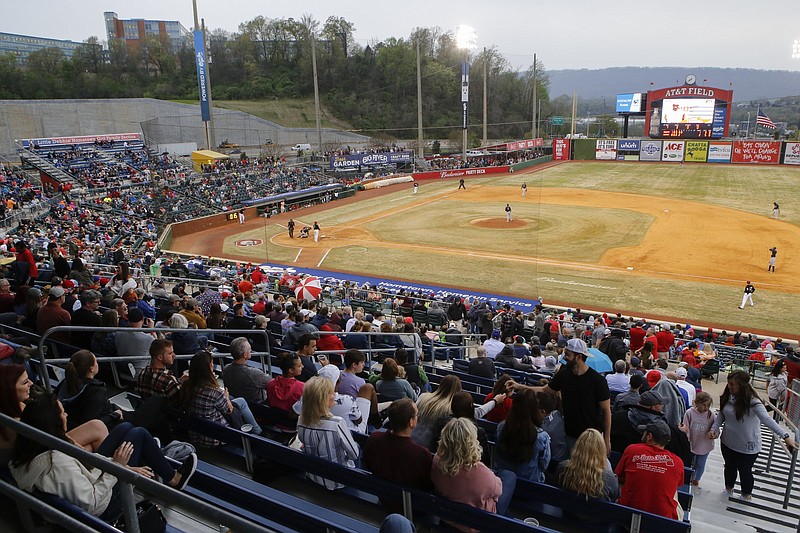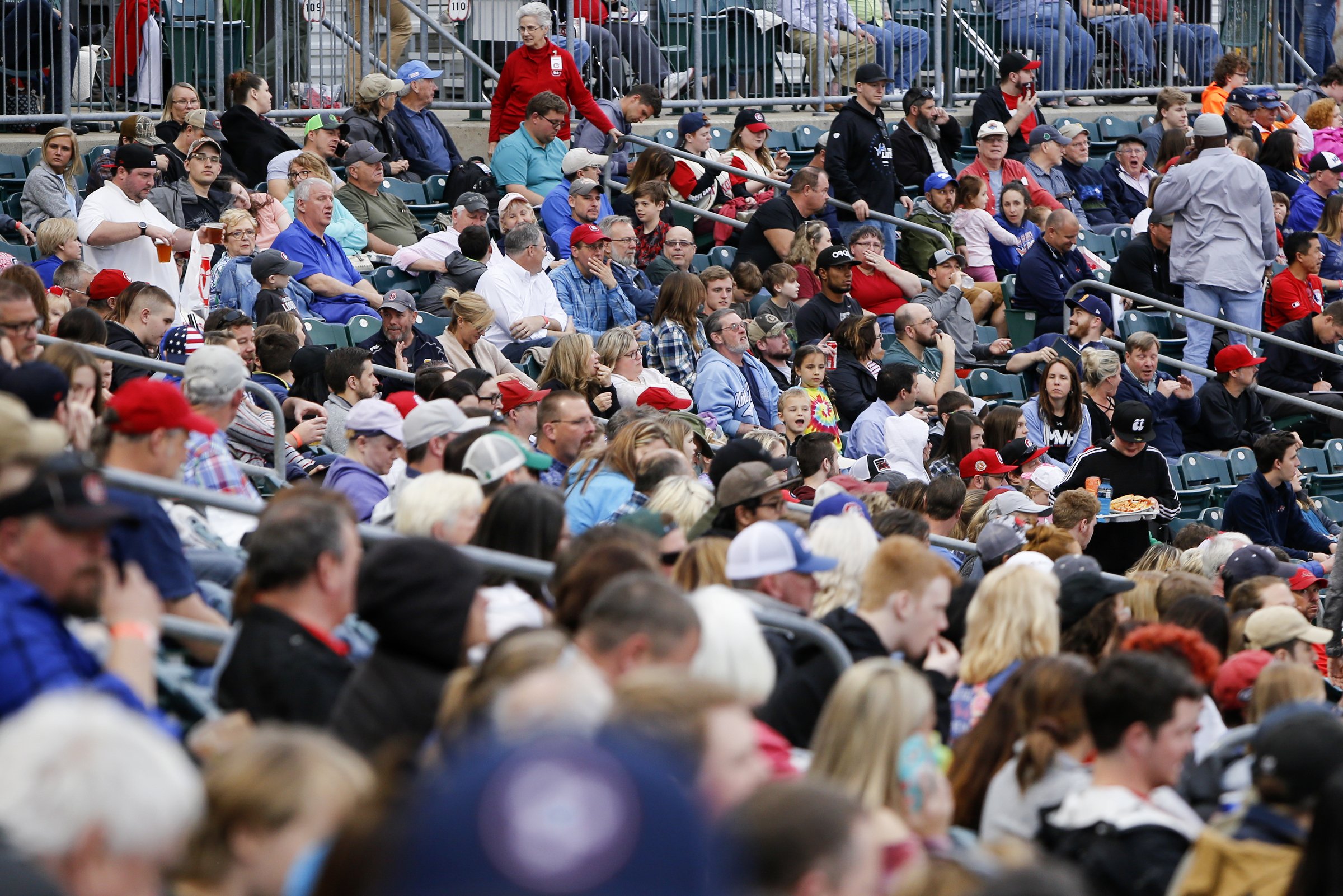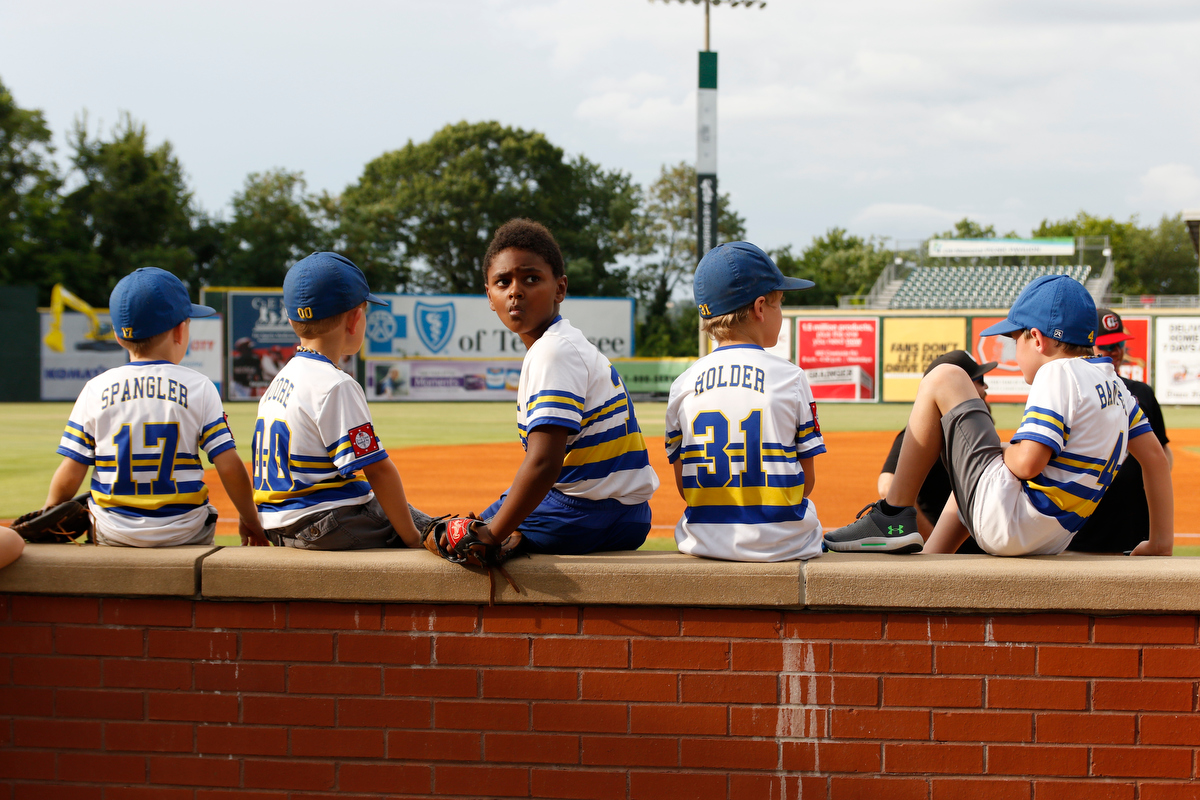LEXINGTON, Ky. -- The Lexington Legends take the mantle of home team seriously. The owners of this minor league baseball franchise are immersed in regional charities. Its handlebar-mustachioed mascot, Big L, crashes dozens of birthday parties every year. Its ballplayers routinely visit the hospital bedsides of children.
The owners say their team's ability to draw 4,000 fans a game has hinged in part on its connection to Major League Baseball, first as a Houston Astros affiliate and now with the Kansas City Royals. Locals who may never visit a major league stadium can see the hottest prospects, the future Jose Altuves, down at Whitaker Bank Ballpark. All for $5.
But this opportunity of basic American fandom may soon vanish from dozens of communities across the country.
MLB is proposing to sever its parent-club ties with the Legends and 41 other minor league teams -- from the Chattanooga Lookouts, whose roots date back to 1885, to the PaddleHeads of Missoula, Montana. It is all part of MLB's desire to overhaul the lower minor leagues and the way that promising ballplayers are developed.
(Read more: Lookouts among teams that could be cut under new MLB proposal)
Under the proposal, the 42 newly independent teams would be welcome to join a lower-quality Dream League populated largely by undrafted and released players, a plan one minor league official called a "death sentence" for the clubs. Loss of major-league affiliation would significantly diminish a team's cachet and market value -- a prospect so devastating that some affected team owners have been reluctant even to inform their employees.
"My job is to save baseball in all 42 of those communities," Pat O'Conner, the president and chief executive of Minor League Baseball, said. "If that's possible."
The owner of the Legends, Sue Martinelli Shea, learned that her team was on the so-called Hit List while attending a baseball gathering last month in Charleston, South Carolina, home of the RiverDogs.
Flabbergasted, she called her son, Andy Shea, the team's president, who could not believe what he was hearing. The Legends had just won their second consecutive championship in the South Atlantic League, and were about to be honored by the magazine Baseball America as the best franchise in Class A baseball.
"I didn't have any inkling, let alone any reason, to think we'd be in this position," a subdued Andy Shea said as he sat in a boardroom that offered a spectacular view of dusk descending on the team's infield.
His mother, sitting beside him, added, "My hope and prayer is that Major League Baseball will reconsider this."
Others share the Sheas' anxiety. The proposed contraction essentially calls for wiping out entire leagues. Among them is the 80-year-old Pioneer League, whose eight teams include the Ogden Raptors, a name suggested many years ago by a 10-year-old local girl aware of Utah's bounty of dinosaur fossils.
Dave Baggott, the founder and co-owner of the Raptors and a former minor league player, said he was proud of the team's role in resurrecting a blighted part of downtown Ogden; of the hundreds of thousands of dollars it donates to the community; of a policy not to charge admission to fans 80 and older.
"I'm 59 years old, and it scares the heck out of me of what I might have to do next," Baggott said. "There's a human factor that I don't think these people are taking into account."
Major league teams generally provide and pay for the farm clubs' players and coaching staffs, and minor league organizations cover everything else, including the fields, the equipment, the uniforms and the travel. The arrangement between the two is laid out in the Professional Baseball Agreement, the latest iteration of which expires after the 2020 season.
For the last 30 years, negotiations for these contracts have been mostly congenial. But in this year's talks, a clash of cultures has emerged between MLB's analytics-driven league office and a sprawling minor league system dependent upon a major league lifeline.
MLB contends that its proposed reorganization would make the development of up-and-coming players more efficient, while also improving their work conditions. The plan includes increasing the number of days off, reducing travel time, improving transportation and hotel accommodations, and ensuring that ballparks meet MLB proposals for enhanced standards.
The minor league system has 160 affiliated teams. The proposal, which minor league officials are frantically trying to counter, would cut 42 teams and add two independent franchises for a total of 120 affiliated teams. Eliminating hundreds of athletes from the system would allow baseball to increase the salaries of players on affiliated teams -- an issue that has recently been contended in court.
Morgan Sword, senior vice president of league economics and operations for MLB, said several factors had determined which teams would retain major league affiliation. One was a team's proximity to its parent club and to potential opponents. Another was the condition of the facilities. A third concerned everyday life, such as hotel availability and general security.
(Read more: Fight to save the Chattanooga Lookouts begins)
Sword rejected the suggestion that the proposal represented a contraction. He said that MLB would subsidize the Dream League, though exactly how is open to discussion. An internal MLB document provided to The New York Times mentions possibly paying for administrative support, umpires and equipment, but makes no mention of covering the largest costs: the salaries of players and coaches, and workers' compensation insurance.
The realignment, Sword said, would generate excitement. "In this new model, we can fill rosters with players from local markets," he said. "This actually may be a much better fit."
He also played down the importance of parent-club affiliation to a minor league team's success, citing MLB research that indicated fans care more about affordability and proximity to the ballpark.
"The fact that they have affiliation is not high on that list," Sword said. He added: "Our objective is not to preserve minor league franchise value. Our objective is to preserve each minor league club's ability to operate."
But in the eyes of minor league officials, the Dream League is more of a Dream-On League. "A fantasy league," one said.
They said that bearing the cost of paying players and coaches would be prohibitively expensive; that some teams are nowhere near a would-be opponent; and that the availability of some publicly owned ballparks would not fit the proposed schedule.
One minor league official, who requested anonymity because of the ongoing negotiations, estimated that of the 42 teams targeted, fewer than 10 would be able to survive.
"I've run independent teams; it's difficult," Baggott, the Ogden Raptors co-owner, said. "And most of the teams in this Dream League are not in markets big enough to support independent baseball."
He added, "The most important thing a minor league team sells is the word 'professional.'"
At this stage of the contentious negotiations, minor league officials say they understand the need to address certain issues -- for example, that some ballparks, both publicly and privately owned, need renovation.
But they also understand that minor league baseball is facing an existential crisis.
After all, the local embrace of a professional baseball team is ingrained in American culture. It is one of the ways that a community sees and celebrates itself. The mere name of a team can evoke a powerful sense of place and history: the Spinners of Lowell, Massachusetts, an old mill city, or the LumberKings of Clinton, Iowa, once known for its timber.
"You have communities that are threatened in this process," O'Conner, the president of minor league baseball, said. "This is the social function. This is the communal centerpiece."
One example: Officials in Elizabethton, Tennessee, population 14,000, faced a choice a couple of years ago. They could either renovate the police station or meet a condition of the Minnesota Twins: to spend more than $1 million modernizing the clubhouse at the city-owned ballpark, home to its beloved minor league affiliate.
They deferred the police station renovation, and now the Elizabethton Twins have a huge locker room, an upgraded kitchen, a training room, and space to relax and study game video.
Sue Martinelli Shea and Andy Shea, of the Lexington Legends, tell a similar story. The Kansas City Royals suggested that the infield at Whitaker Bank Park needed improvement, so the team spent $140,000. The Royals wanted a new bat rack in the dugout, so the team spent $1,200.
"If they wanted something better, I did it," Andy Shea said.
He began listing the many community outreach programs the Legends had embraced. Helping to pay for a new baseball field at Midway University. Donating more than $100,000 to softball and Little League programs. Promoting a language arts initiative in more than 70 elementary schools across Kentucky.
Shea paused. "It's just trying to get as many people as possible working toward a solution," he said. "There are a lot of ways to do that without cutting us and 41 other teams."
As the president of the Lexington Legends spoke, the rain of a sudden cold front began to fleck the boardroom window behind him. It was promising to be a long, long winter.
The Minor-League Teams That Could Lose MLB Ties
A Major League Baseball proposal would drastically alter the landscape of minor league baseball, severing the major-league affiliations of 42 teams in the lower levels of the minors. Some of those teams have been part of their communities for generations, like the Chattanooga Lookouts, whose roots date to 1885; some are playing in stadiums built as recently as 2008, when the Billings Mustangs' Dehler Park opened. MLB contends that the reorganization is necessary to make the minor leagues more efficient and to improve conditions and facilities, but many officials associated with the teams see it as an existential crisis for their organizations. Here are the teams that would be affected under the current plan: Auburn (N.Y.) Doubledays Level: Short-Season A League: New York-Penn League Major league affiliate: Washington Nationals Batavia (N.Y.) Muckdogs Level: Short-Season A League: New York-Penn League Major league affiliate: Miami Marlins Billings (Mont.) Mustangs Level: Advanced Rookie League: Pioneer League Major league affiliate: Cincinnati Reds Binghamton (N.Y.) Rumble Ponies Level: AA League: Eastern League Major league affiliate: Mets Bluefield (W. Va.) Blue Jays Level: Advanced Rookie League: Appalachian League Major league affiliate: Toronto Blue Jays Bristol (Va.) Pirates Level: Rookie League: Appalachian League Major league affiliate: Pittsburgh Pirates Burlington (Iowa) Bees Level: A League: Midwest League Major league affiliate: Los Angeles Angels Burlington (N.C.) Royals Level: Rookie League: Appalachian League Major league affiliate: Kansas City Royals Chattanooga (Tenn.) Lookouts Level: AA League: Southern League Major league affiliate: Cincinnati Reds Clinton (Iowa) LumberKings Level: A League: Midwest League Major league affiliate: Miami Marlins (Norwich) Connecticut Tigers Level: Short-Season A League: New York-Penn League Major league affiliate: Detroit Tigers Danville (Va.) Braves Level: Rookie League: Appalachian League Major league affiliate: Atlanta Braves Daytona (Fla.) Tortugas Level: Advanced A League: Florida State League Major league affiliate: Cincinnati Reds Elizabethton (Tenn.) Twins Level: Rookie League: Appalachian League Major league affiliate: Minnesota Twins Erie (Pa.) SeaWolves Level: AA League: Eastern League Major league affiliate: Detroit Tigers (Kissimmee) Florida Fire Frogs Level: Advanced A League: Florida State League Major league affiliate: Atlanta Braves Frederick (Md.) Keys Level: Advanced A League: Carolina League Major league affiliate: Baltimore Orioles Grand Junction (Colo.) Rockies Level: Rookie League: Pioneer League Major league affiliate: Colorado Rockies Great Falls (Mont.) Voyagers Level: Advanced Rookie League: Pioneer League Major league affiliate: Chicago White Sox Greeneville (Tenn.) Reds Level: Rookie League: Appalachian League Major league affiliate: Cincinnati Reds Hagerstown (Md.) Suns Level: A League: South Atlantic League Major league affiliate: Washington Nationals Idaho Falls Chukars Level: Rookie Advanced League: Pioneer League Major league affiliate: Kansas City Royals Jackson (Tenn.) Generals Level: AA League: Southern League Major league affiliate: Arizona Diamondbacks Johnson City (Tenn.) Cardinals Level: Rookie League: Appalachian League Major league affiliate: St. Louis Cardinals Kingsport (Tenn.) Mets Level: Rookie League: Appalachian League Major league affiliate: Mets Lancaster (Calif.) Jethawks Level: Advanced A League: California League Major league affiliate: Colorado Rockies Lexington (Ky.) Legends Level: A League: South Atlantic League Major league affiliate: Kansas City Royals Lowell (Mass.) Spinners Level: Short-Season A League: New York-Penn League Major league affiliate: Boston Red Sox Mahoning Valley (Ohio) Scrappers Level: Short-Season A League: New York-Penn League Major league affiliate: Cleveland Indians Missoula (Mont.) PaddleHeads Level: Advanced Rookie League: Pioneer League Major league affiliate: Arizona Diamondbacks Ogden (Utah) Raptors Level: Advanced Rookie League: Pioneer League Major league affiliate: Los Angeles Dodgers Orem (Utah) Owlz Level: Advanced Rookie League: Pioneer League Major league affiliate: Los Angeles Angels Princeton (W.Va.) Rays Level: Advanced Rookie League: Appalachian League Major league affiliate: Tampa Bay Rays Quad Cities (Iowa) River Bandits Level: A League: Midwest League Major league affiliate: Houston Astros Rocky Mountain (Colo.) Vibes Level: Rookie League: Pioneer League Major league affiliate: Milwaukee Brewers Salem-Keizer (Ore.) Volcanoes Level: Short-Season A League: Northwest League Major league affiliate: San Francisco Giants State College (Pa.) Spikes Level: Short-Season A League: New York-Penn League Major league affiliate: St. Louis Cardinals Staten Island (N.Y.) Yankees Level: Short-Season A League: New York-Penn League Major league affiliate: Yankees Tri-City (Wash.) Dust Devils Level: Short-Season A League: Northwest League Major league affiliate: San Diego Padres (Burlington) Vermont Lake Monsters Level: Short-Season A League: New York-Penn League Major league affiliate: Oakland A's (Charleston) West Virginia Power Level: A League: South Atlantic League Major league affiliate: Seattle Mariners Williamsport (Pa.) Crosscutters Level: Short-Season A League: New York-Penn League Major league affiliate: Philadelphia Phillies


